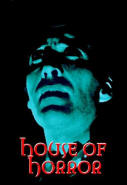Marcus Hearn is one of those
figures who stands out in Hammer fandom. In the
relatively short space of a few years he has
fashioned an image (though not of his making), of the
fan's fan.
His comments on film, and a
long period in journalism have made him a well-respected
and much admired man. Even today his work on Hammer
continues with a successful publishing house and
regular notes for the CD soundtracks from GDI, and
his new status as a DVD extra!!
Marcus was born in Cambridge in 1970, and
spent the first nineteen years of his life there, until
he went to university, in London in 1989. As with so many
in the profession, he has more than one notch on his belt...
"I have a degree in
psychology, but decided upon leaving college to
pursue a career in journalism."
I kicked off the interview by asking him
about his entry into the world of organised Hammer fandom.
" My first contact with
Hammer fans came when I edited the magazine Hammer
Horror for Marvel Comics in 1994, although I should
stress that at that time there was very little, if
any, organised Hammer fandom. The Hammer fan clubs
had all closed down, and the Internet wasn't yet part
of many people's lives. "
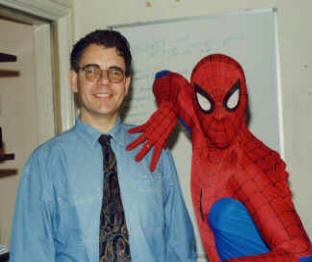 Having instantly
had the impression that he had been involved in Hammer
activities for a long time before that, I felt obliged to
ask him if he had actually been a Hammer fan before
working at Marvel.
Having instantly
had the impression that he had been involved in Hammer
activities for a long time before that, I felt obliged to
ask him if he had actually been a Hammer fan before
working at Marvel.
" I was a fan of particular
films - The Quatermass trilogy, The Brides of Dracula
and so on - before I developed a broader
understanding of the company that was responsible for
them."
In the world of Hammerheads, we tend to
forget that Marcus has been involved in a wide range of
other areas. Does he enjoy being recognised for his
Hammer-related activities?
" Of course I enjoy it when
people say nice things about something I've written
or have been involved in, and criticism of the
constructive kind is OK too. I do lots of other
things as well - people tend to want to talk me about
Star Wars or James Bond more than anything else
really. In a professional capacity anyway."
So, just how did Marcus get to where he is
today. That is, aside from all his Hammer-related
activities?
" I was a freelance
journalist and photographer from 1992 to 1993, when I
joined the staff of Marvel Comics' London office. I
became an editor in 1994, and in 1995 moved to EMAP,
which is probably the country's biggest magazine
publisher.
" I spent two years at EMAP's Farringdon office,
working on computer games magazines. In 1997 I went
to Titan, which is a book and magazine publisher but
also the owner of the Forbidden Planet retail chain (and
publishers of the succesful Hammer Story
book). I edited more magazines than I can
remember while I was at Titan (at one point I had
responsibility for seven different titles
simultaneously) but the mainstay of my work was
editing the official Star Wars and X-Files magazines.
" I suppose you could say that if one thing
characterises my journalistic work in the 1990s it's
that I specialised in editing licensed magazines
based on particular film and television properties. I
became known as a journalist who could liase with
licensors such as the BBC, Lucasfilm, 20th Century
Fox and so on. It can be a tricky business, and it's
a field that a lot of editors are wary of. "
How did you get into writing? Was it
through the usual road of fanzines and so on?
" I always enjoyed English at
school, though I never really did the fanzine thing
much. I worked on the reviews column of the student
union magazine, but that was really because I wanted
to be on the mailing list for free records! I
freelanced quite a lot from the age of 19 onwards,
and it was a useful way to supplement my grant when I
was at college. It saw me through those years, to be
honest. By 1993 I had enough contacts to hassle
people into giving me some office experience. I
joined Marvel as an unpaid temp - just to get the
line on my CV - and three weeks later was offered a
job by my guv'nor Gary Russell. He saw some potential
in me and I owe him an awful lot. "
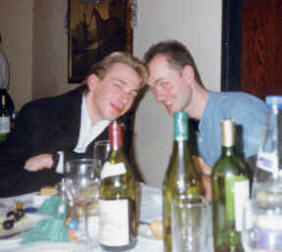 How did you land your editorial post at
Marvel on their short-lived Hammer Horror
magazine?
How did you land your editorial post at
Marvel on their short-lived Hammer Horror
magazine?
" I had been the editor of
Marvel's Doctor Who Magazine, which is a job I
absolutely loved, when the editorial director Paul
Neary called me into his office to discuss Hammer.
Paul had been one of the illustrators of Dez Skinn's
Hammer magazine in the 1970s (he inked the Dracula
and Moon Zero Two strips). Paul had been approached
by a company called MTC, who had been appointed by
Hammer to drum up some licensing business. Paul
obviously had a good knowledge of Hammer, having
worked with the company during Michael Carreras's
chairmanship in the 1970s, and saw the potential in
launching a new magazine. I was offered the job of
editing the magazine because, I think, Marvel wanted
a similar approach to that which had been adopted on
Doctor Who Magazine. "
I confess, that when I first started
reading DWM, you were the outgoing editor.
Presumably at this point, Hammer was trying to stir up
interest in the company as a whole, perhaps to preceed
new business (that is, new films and so on). Do you think
that worked at all?
" Well there were T-shirts,
magazines, fridge magnets and so on. All these
products brought revenue in for the company. I think
MTC did a good job, but it must have been difficult
to take it any further without any new films or
television programmes. "
Despite being the biggest selling mag of
its type, here in the UK at least, it was pulled after a
mere eight issues. How did you feel about that ?
" It had been a year's work
and all the staff were upset. I was particularly
upset because I lost my job at the same time! The
whole of the magazine department closed when Marvel
was taken over by an Italian publisher. They had no
interest in continuing with the Hammer magazine, or
indeed any magazine except the Doctor Who one. It was
sad, but that's life. Paul Neary went at the same
time, and we chatted about it in the pub afterwards.
He was philosophical about it, having seen a fair few
ups and downs in his career. Funnily enough I was
later reunited with Gary Russell at EMAP, although we
worked on different magazines. "
How long had everyone hoped the magazine
would run?
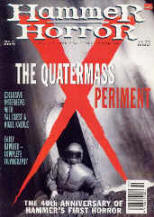
" Whenever you launch a new
magazine you want it to last for as long as possible.
You usually know whether you're on to a winner or not
if the sales have levelled out a profitable rate by
the fifth issue. We knew Hammer Horror was a goer
because the Collectors' Special did well - that was
designed as a trial, really. "
Was there some sort of plan for what the
series would cover?
" Oh yes, we had a detailed
plan for future issues. Don't ask me to try to
remember it though. Part of the plan was to bring
Denis Meikle on board as the regular writer of the
pull-out sections in the middle. He ultimately only
completed one of those, of course - The Quatermass
Xperiment. "
What was it that spurred you into working
on The Hammer Story, along with Alan Barnes? Did
it come about because of the demise of the magazine?
" Indirectly, yes. Alan was
let go at the same time as me, and while we were
crying into our beer one night we realised that we
hadn't even begun to tell the story in the magazine -
we were sitting on a huge amount of stuff. Some
complicated rights issues prevented the magazine
continuing, so a book seemed like the ideal home for
the pictures and the information. "
 I presume then,
that there was still an awful lot left over?
I presume then,
that there was still an awful lot left over?
" Boxes of stuff. "
If someone offered you the chance to do
the magazine again now, would you?
" I'd be hard pressed to find
the time now."
Just how did you go about working on the
book?
" Very quickly. MTC came back
on the scene and struck the licensing deal between
Hammer and Titan Books. Titan wanted to launch the
book to coincide with the 40th anniversary of The
Curse of Frankenstein, and we had to race to meet
that deadline. "
( Titan published The Hammer Story in
hardback in May 1997, with the soft back edition
following in October of the same year)
How long did it take from conception to
publication?
" I can't remember, but not
very long. I seem to remember that the intensive
writing period was about three months."
I've heard it said that you had to watch
every film in researching the book. Is this the case? Or
did you just rewatch the ones you concentrated on in the
book?
" We watched every single
film that received a fully-fledged entry in the book,
with the sole exception of The Ugly Duckling, which
eluded us.
[to date it is the one feature which
has eluded most Hammer fans. It is believed that all
copies of this 1959 spin on the Jekyll and Hyde
story,were destroyed. A Hammer comedy it starred
Bernard Bresslaw and Jon Pertwee. Its return is
eagerly awaited by thousands of Hammer enthusiasts -
Ed.]
" We watched quite a few of the other films that
got merely cursory mentions as well. It was
especially important to us to compile the synopses
after watching the films - we were genuinely shocked
about the innacuracies in so many previously
published synopses. Rule one of film research - watch
the movie."
Is there any truth to the tale that on
occasion you were still finishing chapters as the courier
came to pick them up for the publishers? Or do we just
take that as a sort of urban myth in relation to the book.
" It's true I'm afraid -pages
would came off my printer and go straight into the
hands of a motorcycle courier. We were really up
against it. "
Why were so many of their films passed
over in writing up the detailed sections of the book? Was
this due to personal preference or astute observation of
the market potential of a book concentrating on the
horror pictures?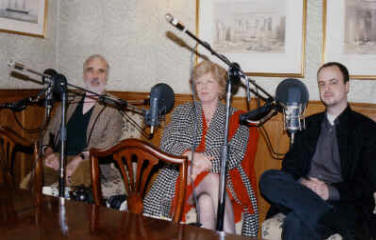
" It was a marketing decision.
It was a mass-market coffee table book, aimed
squarely at the trade. You can't afford to spend too
much time on Dick Barton - Special Agent in a book
like that. Having said all that, I should point out
that the book was originally conceived to run to 60,000
words - that's what it says on my contract. I think
they printed around 150,000 in the end. "
Well, I guess there is always the 'Exhaustive
Filmography' which did include just about
everything, though a bit pricy.
[by
Tom Johnson and Deborah Del Vecchio, printed in a black
hardback cover, at around the £50 mark!]
" That book was a crucial
reference. It came in very useful. Denis Meikle's
book A History of Horrors was also very useful. It's
an outstanding piece of work by a brilliant writer."
Were you pleased with the overall result? The
Hammer Story regarded by many fans as *the* book on
the studios.
" It's very kind of you to
say that. We had some great support from the
editorial staff at Titan, and I think their studio
did a marvellous job as well. By the time the book
was in production I was actually working in the
company's magazine division so I could keep an eye on
the book's progress as it was being put together. I
wrote captions in my lunch break, and generally made
a nuisance of myself. "
Somewhere in all this, you must have
developed a taste for publishing, now braving the market
as a publisher yourself with Reynolds and Hearn. Why do
this now?
" I was offered the
opportunity to become the editorial director of a
publishing company last year, and it came at a point
when I was eager to try something new. I'd spent a
long time in licensing and I was looking for a way
out. And I believe that everything should be an
adventure - if you've got the chance to do something
new then I think you should grasp it. You only regret
the things you didn't do."
Is this what you want to do in the future,
concentrate on the managerial side of things, rather than
the creative?
" As the company grows the
decision will probably be taken for me. We've
published 11 books this year, and I'm writing two at
the moment. It's difficult to find the time to have a
life outside writing sometimes."
Most of our readers will know that you are
the Hearn in the company's title, but who is Reynolds?
" Richard Reynolds is my
business partner. He started his career with the
Oxford University Press, and then spent some 14 years
at BT Batsford, latterly as the executive editor of
the film and television list. In 1995 Richard
commissioned my first book, which was a study of
Quentin Tarantino's films. He also commissioned a
book I wrote about the making of the James Bond films.
I wrote both of those with Alan as well."
How do you find the work and the
discerning market of readers?
" It's challenging but it's a
lot of fun. I learn something new every day."
What exactly do you do as an editorial
director?
" I commission, proof,
picture research, co-ordinate design work ... I'm
working on a tap-dancing routine as we speak."
Two of your recent titles included Roy
Ward Baker's The Director's Cut and The
Peter Cushing Companion. How do you decide whether
or not a title is worth going ahead with, and what made
you decide on these two?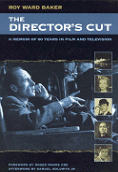
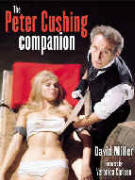
" Actually you've just picked
two titles that Richard came up with, in conjunction
with the respective authors of course. Every
commissioning consultation is ultimately made
following consultation with our sales manager. If he
can't sell it, we won't print it. Obviously Peter
Cushing and Roy Ward Baker are both subjects close to
my heart, and having an understanding of the market
for this type of book helps us to help our sales
manager."
Will there be more of that sort of book
from R&H then?
" I'm glad to say that we'll
be publishing Val Guest's autobiography in spring
2001. Val is one of my heroes, and I'm delighted
we've signed him up."
The passing of Peter Cushing back in 1994
has been cited by some as the day Hammer finally died.
Michael Carreras of course died around the same time.
Since then, more and more of the familiar faces are no
more. Is it becoming harder to enthuse for the films as a
result?
" Not really, because I'm not
old enough to have ever seen a Hammer film at the
cinema so it's all past tense to me. I remember
Peter's death came at a time when we were setting up
Hammer Horror magazine. It came through on the radio,
and once our sadness had subsided a little we started
to get anxious. I don't think it affected the sales
of the magazine. This is going to sound cynical, but
I think it might have aroused a little extra interest
in Hammer."
I don't think it's cynical at all. I
remember having only recently gotten into Hammer, through
Peter Cushing when he died. I also remember the shutting
down of the magazine, and regretting not having bought
the collectors issue when it was in the shops!
" I wish I'd kept a few more
than I did. "
Interest in Hammer now seems much higher
than ever before, don't you think? Particularly, younger
fans who wont ever have seen a Hammer film on the big
screen. Like myself in fact.
" Hammer fandom seems to
be growing all the time, although it seems to me
that most Hammer fans are primarily collectors.
That's one of the things that distinguishes them
from, say, Doctor Who fans for example."
[as both a Doctor Who and
Hammer enthusiast myself, I guess that's
a fair comment. Though I have more Who
material than Hammer stuff. Perhaps the
difference is that with Who, there is a
continuing product. Its still very forward
looking. Hammer is very nostalgic]
You are also involved in Hammerweb,
Hammer's official foray into new technology. How do you
find things like the Internet?
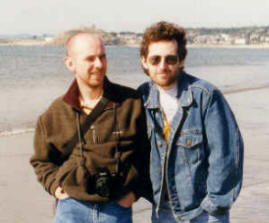
" I was keen not to lose
touch with the chaps at Hammer after the book was
finished, and there was still so much more
information, so an official website seemed the
next logical step. Graham Skeggs, Hammer's legal
and business affairs director, was all for it.
Hammer put up the money, and I put up the words.
We are all enormously grateful to Joe McIntyre
and Simon Middleton, who have done such a
magnificent job of the tricky part - the coding!
"
The take-over of the company in January by
Saatchi and Saatchi came as a bit of a surprise to many,
though it has been on the cards as far back as 1997.
Involved as you are in the official website, you were
probably more aware of developments that most. How did
you feel when they announced the take-over and plans for
the future?
" That's a difficult question
to answer. I had got to know Roy Skeggs, the former
chairman of the company quite well, and I was very
sad that he decided to step down after so many years.
I owe Hammer an awful lot on so many ways. I'm glad
that Graham, his son, is involved with the new Hammer.
I've had a few meetings with the new management and
they're lovely people. There's a genuine enthusiasm
there, and a real respect for the company's legacy."
" I should point out, by the way, that it is
only Charles, and not Maurice, who is involved with
Hammer."
Do you think personally that the future is
good for the new company, or should we remain
optimistically sceptical?
" I can't answer that
question because I don't know what your hopes are for
the new company. I'm confident that it's in good
hands."
Well I know that there are an awful lot of
people who would love to see a new Hammer film, but there
is also an awful lot of doubt. Despite the best of
intentions, Roy Skeggs never seemed to give the fans new
product. Though with the advent of the website and the CD
soundtracks, I know there has been a step in the
direction that the fans might be pleased with.
" Priority number one as far
as I'm concerned should be renovation and
preservation of the archive. And I understand that's
on the cards, which is reassuring."
Over the years you've provided a hoard of
notes for CDs and videos, written for assorted magazines
and books, and been involved in publishing generally;
what has been the highlight so far?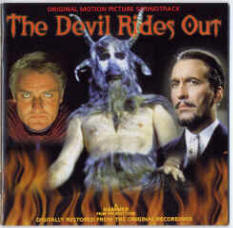
" Working with Hammer has
brought so many highlights - the magazine was a very
happy experience, I'm very proud of the book, I love
working with Joe and Simon on the website and the
ongoing CD soundtrack project is great fun. I've
managed to earn a bit of a living out of doing things
I enjoy, and it's always been a pleasure because
people associated with Hammer are always so
enthusiastic and friendly. The highlights have been
people more than things. "
Does that apply to you non-Hammer work as
well?
" Not to such a great degree.
Hammer people are happy people."
Where do you go from here?
"Reynolds & Hearn are
publishing six books between now and Christmas and
I'm currently commissioning for the 2001 list (keep
an eye on
www.rhbooks.com for the
details). The Scars of Dracula and Devil Rides Out CD
soundtracks will be released in the next few months,
and I've written notes for both of those. I
interviewed Christopher Lee for The Devil Rides Out,
and that will appear as the final track on the album.
Next up from GDI Records after that is The Curse of
the Mummy's Tomb.
" You'll also be able to hear my voice on the
forthcoming audio narration tracks for the DVDs of
Scars of Dracula, The Horror of Frankenstein, Lust
for a Vampire and Fear In The Night.
" A revised and expanded edition of my James
Bond book Kiss Kiss Bang! Bang! is being published by
Chrysalis Books in time for Christmas, and I'm
currently collaborating with Bond director John Glen
on his autobiography. That will be published by
Chrysalis in the spring.
" On top of all this, I'm editing a new part
work called The Official Star Wars Fact Files. This
is the first Star Wars magazine to go out all over
the world, and it will be available every week from
October onwards. That's something I've been cooking
up since last year. The exhibition I wrote, 'The Art
of Star Wars', has just completed its run at the
Barbican Centre in London and has now moved to
Bradford. It's going to Edinburgh from there, and
then it's touring Europe."
Do you have a personal favourite when it
comes to the soundtracks?
" I thought Taste the Blood
of Dracula was a great score and a great package, but
The Devil Rides Out gives it a run for its money. Of
all the sleevenotes I've written, the one I'm
proudest of is the essay in the Comedy Collection.
"
And finally, Doctor Who or Hammer
Horror?
" Well Robert, all my
favourite Doctor Who stories are virtually Hammer
remakes. Does that get me off the hook?"
I noticed that in your piece for the Tom
Baker DWM a few issues back (Doctor Who Magazine # 290).
Lots of Hammer allusions. I'll let you get away with it.
Many thanks for your time Marcus, I know you're
incredibly busy. Perhaps you'd like to talk to us again
sometime?
" No problem - it's been fun."
Details
of current and forthcoming books from Reynolds and Hearn
are available online at
www.rhbooks.com
